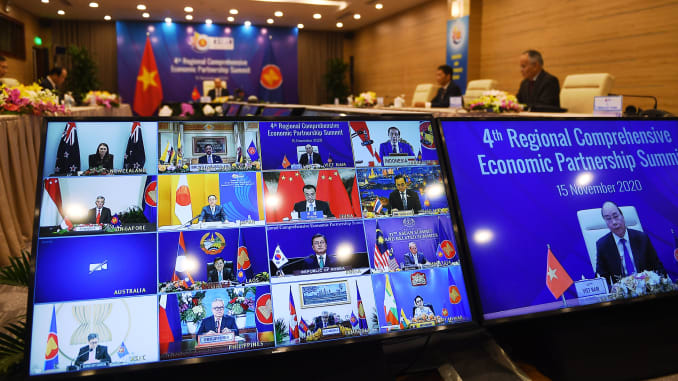We, the Heads of State/Government of the Member States of the Association of Southeast Asian Nations (ASEAN) – Brunei Darussalam, Cambodia, Indonesia, Lao PDR, Malaysia, Myanmar, the Philippines, Singapore, Thailand and Viet Nam – Australia, China, Japan, Korea and New Zealand, met virtually on 15 November 2020, on the occasion of the 4th RCEP Summit. We were pleased to witness the signing of the RCEP Agreement, which comes at a time when the world is confronted with the unprecedented challenge brought about by the Coronavirus Disease 2019 (COVID-19) global pandemic. In light of the adverse impact of the pandemic on our economies, and our people’s livelihood and well-being, the signing of the RCEP Agreement demonstrates our strong commitment to supporting economic recovery, inclusive development, job creation and strengthening regional supply chains as well as our support for an open, inclusive, rules-based trade and investment arrangement.We acknowledge that the RCEP Agreement is critical for our region’s response to the COVID-19 pandemic and will play an important role in building the region’s resilience through inclusive and sustainable post-pandemic economic recovery process.
We note that the RCEP Agreement is an unprecedented mega regional trading arrangement that comprises a diverse mix of developed, developing and least developed economies of the region. As an agreement that would cover a market of 2.2 billion people, or almost 30% of the world’s population, with a combined GDP of US$ 26.2 trillion or about 30% of global GDP, and accounts for nearly 28% of global trade (based on 2019 figures), we believe that RCEP, being the world’s largest free trade arrangement, represents an important step forward towards an ideal framework of global trade and investment rules.
We also note that the RCEP Agreement is the most ambitious free trade agreement initiated by ASEAN, which contributes to enhancing ASEAN centrality in regional frameworks and strengthening ASEAN cooperation with regional partners. With 20 Chapters, the RCEP Agreement, as a modern, comprehensive, high-quality and mutually beneficial agreement, includes areas and disciplines that were not previously covered in the existing free trade agreements between ASEAN and non-ASEAN countries participating in RCEP. Aside from the specific provisions that cover trade in goods and services, and investment, RCEP also includes chapters on intellectual property, electronic commerce, competition, small and medium enterprises (SMEs), economic and technical cooperation and government procurement. We are confident that the RCEP Agreement would open a vast range of opportunities for businesses located in the region especially in terms of market access given the level of liberalization for trade in goods and services and investment.
We agreed that the opportunities accruing from the RCEP Agreement and its full potential can only be realized once the Agreement enters into force. Towards this end, we task our officials to expedite respective domestic ratification procedures for the early entry into force of the Agreement, which will take place when at least six ASEAN Member States and three non-ASEAN signatories deposit their instrument of ratification, acceptance or approval with the Agreement’s Depositary. We have also asked Ministers to develop RCEP as a platform for dialogue and cooperation on trade and economic issues affecting the region and to report to us regularly.
We are committed to ensuring that RCEP remains an open and inclusive agreement. Further, we would highly value India’s role in RCEP and reiterate that the RCEP remains open to India. As one of the 16 original participating countries, India’s accession to the RCEP Agreement would be welcome in view of its participation in RCEP negotiations since 2012 and its strategic importance as a regional partner in creating deeper and expanded regional value chains. In this regard, we welcomed the “Ministers’ Declaration on India’s Participation in the Regional Comprehensive Economic Partnership (RCEP)” affirmed by the RCEP Ministers, as attached.





